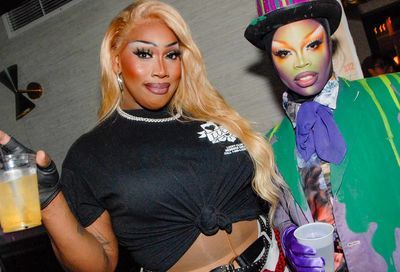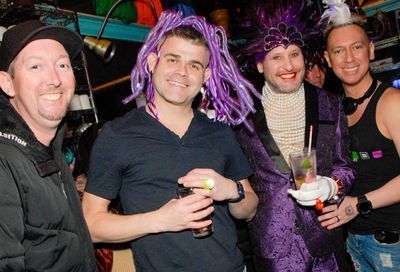“Three Sisters” and “No Sisters” at Studio Theatre (reviews)
Studio's Three Sisters is even more thrilling when paired with Aaron Posner's experimental companion, No Sisters

Given a choice of whether to watch the handsome, stately production of a century-old melodrama that you’ve seen before, or instead to slip in the back of the house for a privileged peek behind the facades of some of that show’s pivotal characters, one might reasonably elect the latter over the former. Imagine attending a revival of another staid but soapy drama that ended with a shocking duel: the 2017 Academy Awards ceremony. The best seat in the house wouldn’t necessarily be out in the auditorium next to Meryl Streep but backstage near one of the smoking guns, those notorious Price Waterhouse briefcases. A front seat for the behind-the-scenes action that exploded at the margins of showbiz catastrophe might just make for the better ticket.
Anton Chekhov’s Three Sisters famously wields its own smoking gun, though only offstage. Studio Theatre, in collaboration with multimedia production company New Neighborhood, offers theatergoers the unique opportunity to experience the drama both on and offstage, with their productions of Three Sisters (★★★½) and Aaron Posner’s new Chekhov-inspired riff, No Sisters (★★★★). The two shows are running not only in repertory, but performed simultaneously, with several members of the cast of Chekhov’s play dashing in their offstage moments from one Studio theater to appear onstage in a different theater, as the same characters, but in Posner’s clever riff on the play, described as a hangout “in a weird-ass existential Chekhovian green room.”
One might opt to undertake just one leg of this ambitious “choose-your-own-adventure” trip through the tangled lives and loves of the Prózorovs, but the most rewarding path is to experience both.
First, director Jackson Gay’s straightforward staging of Chekhov’s tragicomic classic revolving around the sisters Prozorova — spinster schoolteacher Ólga (Bridget Flanery), unhappy wife Másha (Caroline Hewitt), and naive, young Irína (Emilie Krause) — solidly entertains. Across a simply dressed and lit set evoking the family’s voluminous house, and the forest of “wonderful, uncomplicated birches” that surround it, four years of deaths, births, marriages, affairs, deceptions, and confessions unfold. Arranging and rearranging themselves in crowded party scenes, or set off front-and-center for heated tête-à-têtes, Gay’s players capture the household’s constant whirlwind of activity amid the steady forward advance of life.
So unerringly tasteful, at times just a well-pinned hair away from precious, the production can appear to be handling the messiness of all of Chekhov’s despair and longing too delicately. Flanery, Hewitt and Krause gel as sisters bound by their strength and intelligence, but it’s Hewitt as Másha, a passionate, unfulfilled soul, who most vividly transcends the trappings of 19th-century dramatics to register an urgent portrayal of womanhood. Mercurial and mysterious with her lover and with her husband, Hewitt’s Másha benefits from playing opposite Greg Stuhr’s complex, clearly delineated Vershínin, as well as Todd Scofield’s kind and ultimately perceptive Kulygin.

Ro Boddie as Baron Túzenbach, Biko Eisen-Martin as Solyóny, and William Vaughan as Fedótik — all pulling double-duty in Three Sisters and No Sisters — each make a strong impression as the soldiers buzzing like flies about fickle Irína. Eisen-Martin’s army captain Solyóny doesn’t really read as a career soldier, but the actor broods and pontificates compellingly in the role. Joining those actors in the casts of both plays, Ryan Rilette and Kimberly Gilbert, as the sisters’ sainted brother Andréy and his diabolical bride Natásha, certainly do read as the mismatched engaged, later married, couple who gradually usurps the home at the center of these characters’ world.
Betraying no muss or fuss from whatever hectic maneuvers might be involved in shuffling half a dozen actors between two shows within the same three hours, the production delivers a thoroughly engrossing and quite funny, if not freshly revealing, take on a classic. The Prozorova sisters’ moody search for meaning in love, work, family, and philosophy sparks a few well-contained fires, but really commands attention as part-one of an electric two-part theatrical event.
Running in Studio’s downstairs Mead auditorium, Three Sisters approaches the calamitous drama surely, but renders the pain-stricken proceedings a hair too prettily. Upstairs on the Milton stage, however, writer-director Aaron Posner’s No Sisters more than compensates by reveling in every transgressive “Fuck!” and freak-out in its existential offstage mind-trip with Sisters characters Baron Túzenbach, Solyóny, Fedótik, Anfísa, Natásha, Kulygin, and Andréy — and none of the three sisters.
Following the success of Stupid Fucking Bird, his adaptation of Chekhov’s The Seagull, Posner returns to the Russian playwright’s profoundly deep well with this gutsy, new take on the multi-layered tale of the Prózorov family’s turbulent lives in a provincial Russian town. Enjoying this play outside the play, set in the intimate, modern-decorated surroundings of a backstage holding area for characters in the sisters’ drama not named Ólga, Másha or Irína, doesn’t require prior knowledge of Three Sisters, nor even of the story’s basic outline.
All is explained in lucidly relayed detail by the fictional onstage company, who appear usually solo or in pairs, keenly self-aware that while they’re chilling with an audience behind Posner’s curtain, they’re also living their immortal role in Three Sisters on a stage elsewhere. Set free of those blasted sisters — insufferable narcissists, according to one relative — these semi-major and supposedly minor players in their household are the ones who set the rules in here. On this stage, they playfully, spitefully, hilariously explore the original play’s rich relationships and subtext.
In a well-timed succession of character close-ups, the lovesick Baron and Solyóny are compelled to confess themselves. Good soldier Fedótik wonders if any lovers, or anyone, ever “really see each other.” Cowardly Andréy holds court on the disappointments that lead to bitterness, while his once-beloved Natásha rhapsodizes about hatred, a subject close to her heart. Kulygin, just one cuckolded husband in Three Sisters, reclaims some of his power arguing for the cause of civil society. Anfísa, the family’s elderly, declining maid, oppressed by Natásha in Chekhov’s play, relishes having an attentive audience to hear her air out her frustrations with the Prózorovs, and with life and loss and old age.
In short, Posner shrewdly exploits Chekhov’s coterie to wax poetic and prosaic on a variety of subjects. Some of it sounds like vamping, to facilitate the precise coordination of the myriad entrances, exits and sprints between two simultaneous performances. (Hats off to the intrepid stage management crew!) To Posner’s credit, much of it casts these characters, arguably the most despairing and damaged of the original lot, in a warmly revealing light.
Again, although it isn’t necessary to have seen Studio’s production of the classic in order to plug into the energized company’s brave technical feat with this spin-off, it helps to know where the action in Three Sisters is headed. And it does seem essential to witness the performances these actors give on one stage, to fully appreciate their respective achievements in expanding or subverting those performances on a second stage. In particular, Eisen-Martin’s volcanic Solyóny appears both more approachable and more definitely unhinged, in what is, conversely, an impressively controlled turn.
Scofield’s uptight Kulygin, so often the butt of the joke around his wife and her sisters, relaxes outside their company into quite the winning ringmaster of Posner’s backstage circus. And Nancy Robinette, whose doddering Anfísa can be trusted with less and less actual work in the Prózorov house, blossoms gloriously into a wise and loquacious survivor once left to the devices of no sisters. She makes for an amiable companion to her fellow wanderers inside the green room, and to any humble listener who’ll lend an ear to “some old lady in a play” voicing astute perspectives on darkness, devastation, hope and longing, or as she calls it, “Life, life, life.”
Three Sisters and No Sisters run to April 23, in separate auditoriums at Studio Theatre, 1501 14th St. NW. Tickets for Three Sisters are $20 to $69, and tickets for No Sisters are $20 to $45. Call 202-332-3300, or visit studiotheatre.org.
Support Metro Weekly’s Journalism
These are challenging times for news organizations. And yet it’s crucial we stay active and provide vital resources and information to both our local readers and the world. So won’t you please take a moment and consider supporting Metro Weekly with a membership? For as little as $5 a month, you can help ensure Metro Weekly magazine and MetroWeekly.com remain free, viable resources as we provide the best, most diverse, culturally-resonant LGBTQ coverage in both the D.C. region and around the world. Memberships come with exclusive perks and discounts, your own personal digital delivery of each week’s magazine (and an archive), access to our Member's Lounge when it launches this fall, and exclusive members-only items like Metro Weekly Membership Mugs and Tote Bags! Check out all our membership levels here and please join us today!























